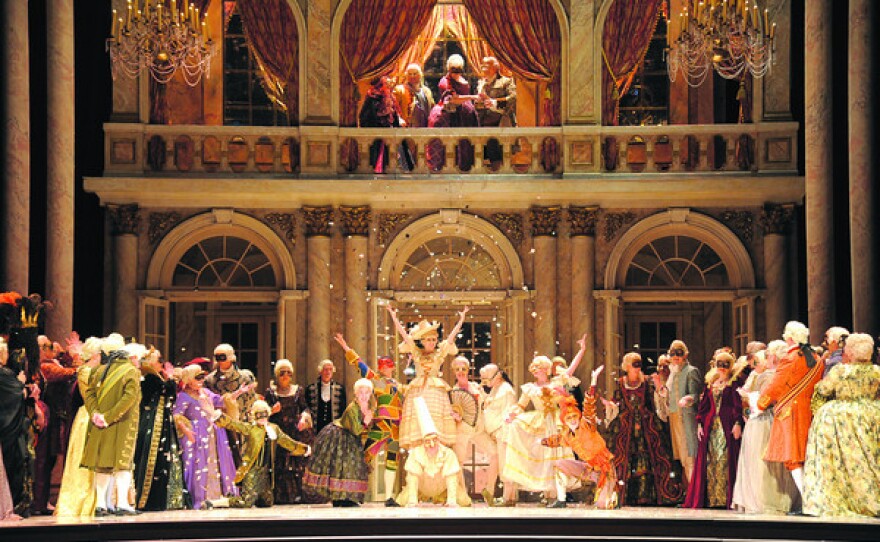After two months of handwringing, upheaval and off-stage drama, the San Diego Opera’s board of directors voted unanimously to rescind a vote to close the company.
Board President Carol Lazier, surrounded by fellow board members, opera staff, choristers and union members made the announcement at a news conference outside the Civic Theatre in downtown San Diego where the company stages its operas.
Lazier said the 2015 season — the opera’s 50th — will go on. It will include three fully staged operas: “La Bohème,” “Don Giovanni” and the San Diego premiere of John Adams’ “Nixon in China.”
“We’re just ecstatic. I don’t know what else to say,” said Lazier. “The support from the community and donors has been overwhelming.”
The board voted on March 19 to close in April at the end of the 2014 season, a move that shocked many. Some directors soon regretted it and led a revolt to keep the company open, voting twice to postpone the closing.
The most dramatic moments came when a group of longtime board members, including the former board president, stormed out of a meeting and resigned, and later when the board ousted the company’s general director, Ian Campbell, who led the opera for 31 years. Lawyers for the two sides are still negotiating a settlement with Campbell and his ex-wife, Ann Spira Campbell, who was the opera’s deputy director.
The decision to proceed with the 2015 season hinged on the results of fundraising efforts as well as cost-cutting measures. Singers and other union members agreed to — or expressed a willingness to — take a 10 percent pay cut as long as similar cuts are taken throughout the company. Staff members are willing to take a 10 percent decrease in pay next year, an opera spokesman said.
Ticket prices have been reduced and will start at $35 per opera for subscribers and at $105 for the three-opera season. The company also expanded the number of orchestra seats priced at $99.
Other opera companies and the San Diego Symphony made in-kind contributions to the upcoming season, which has helped keep costs down.
On the fundraising side, the opera raised more than $2 million in crowd-funding campaigns. Lazier donated an additional $1 million, bringing the funds to the $3.5 million goal the directors wanted to reach before they felt comfortable announcing a 2015 season. The opera needs $6.5 million to stay open through next year. The original budget for 2015, proposed before the vote to close, was projected to be $17 million.
All three operas and cast in the season line-up were chosen by Campbell at least two years ago, the typical time needed to secure singers.
Wagner’s “Tannhäuser,” previously scheduled for 2015, was dropped because, an opera spokesman said, it is too expensive to produce. The opera is more than three hours long and requires a great deal of labor and rehearsal time, both of which cost money.
To celebrate the 50th anniversary, the opera plans to stage two gala concerts with a selection of arias, duets and choruses featuring soprano Lise Lindstrom — who was supposed to perform in “Tannhäuser” — and “surprise guests.”
A new artistic adviser to the opera, along with the artists, will help select the musical content. Described by opera staff as a “big gun in the opera world” at a recent meeting, the artistic adviser will be named in the coming weeks.
The singers under contract for “Tannhäuser” have been invited to sing in the gala concerts, a recital, or come back and sing for the opera in a future season.
The San Diego Symphony, which has a contract with the opera to provide orchestra musicians for opera performances, has donated Copley Symphony Hall as a venue for the gala concerts. Rental costs at the Civic Theatre can run as high as $129,000 for the run of just one opera, according to license agreements from 2011.
The opera’s contract with the symphony requires five years’ notice before any changes are made to it. The opera will pay the full amount owed the symphony next year, even though with the cancellation of “Tannhäuser” musicians aren’t required to play as many operas.
Houston Grand Opera is donating the sets for “Nixon in China,” free of charge, representing a savings of around $60,000.
An opening recital featuring soprano Ailyn Pérez and tenor Stephen Costello, the couple who starred in “Romeo and Juliet” at San Diego Opera in 2010, is possible but has not yet been finalized. The same is true for a mariachi opera similar to the one staged in San Diego during the 2013 season.
Now that the 2015 season has the greenlight, Lazier said the board is already strategizing for the future.
“I don’t know what the company will look like in 2016, but we’re going forward,” said Lazier. “This is not the end, it’s just the beginning.”






